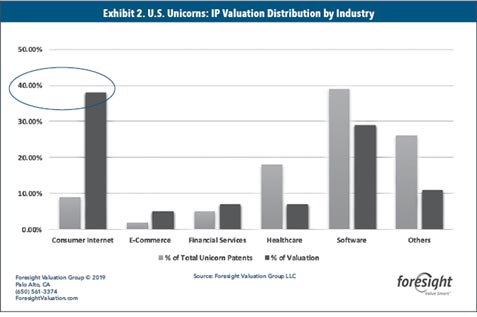Chart of the Month: May 2023
Does Intellectual Property Drive Unicorn Value?
Patents are important. So important, in fact, that they are mentioned in the U.S. Constitution. But how important are they in the creation of unicorns (startups that achieve a $1 billion market valuation).
Startups wrestle with patents. On one hand, you want a patent to prevent competition, but on the other hand, unless you have the money and energy to defend your patent(s) for potentially years, all you are doing is disclosing a target for your competition to shoot at or invent around.
In the end, it all comes down to the business model, per this chart published by BVResources and produced by Foresight Valuation Group. The chart illustrates the relationship between achieving unicorn status and number of patents held within the unicorn group.
Here’s the way to read the chart. If the dark bar is taller than the light bar, then patents are a less important value contributor for unicorns in the industry. If the light bar is taller than the dark bar, then patents are more important.

In a way this chart isn’t hard to predict because the desirability of patents is a direct function to how the industry fights off competition. In consumer Internet (think, Lyft) the way to exclude competition is to make a land grab. Raise a ton of money, build infrastructure and brand, and make it prohibitively expensive for new market entrants. It wasn’t about proprietary methods, it was about market penetration, branding and the number of smart phone installs. This is why we have an effective duopoly for ride sharing in the U.S. I don’t know this for a fact, but I’ll bet Amazon didn’t patent a ton of stuff in its early days.
Conversely, healthcare (which I presume includes biotech) is all about patents. That’s what happens when it takes 10 years and $100 MM (at least) to go from molecule to market.
What might surprise you is the relevance of patents to software. Software has the reputation of being nearly impossible to patent. You might as well try to find a commercial without Peyton Manning in it. But patent attorneys are becoming quite adept at patenting software, and while it isn’t easy, a software patent isn’t the rare treasure that its reputation carries.
You can ask what is in the “Other” category and I have no clue. It’s a mystery like the Turkey Tetrazzini they always served at my college. But apparently patents are a big deal there too.
The decision to pursue patents for your company can be a difficult decision. One factor in that decision should be the industry in which you operate. In certain industries, patents appear to be true difference-makers in terms of value. In others, they don’t move the needle at all. Knowing this can help you be a better decision-maker as to whether to include patents in your value strategy or to invest your funds elsewhere.
Mark Dayman is a partner with BW Arpeggio and the leader of the Disputes, Litigation and Forensics practice. Mark has provided valuation, litigation support and forensic services for over 40 years. His team includes leaders in litigation support and has unique experience in franchising, real estate, hotels and resorts, food and beverage, automotive, and healthcare and medical devices. Mark is a qualified expert in state and Federal courts. He is located in Atlanta but works on cases throughout the US.
Mark Dayman CPA/ABV/CFF, ABAR, CVA
Mobile 678.662.6478